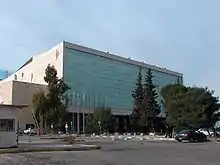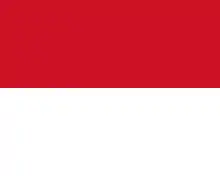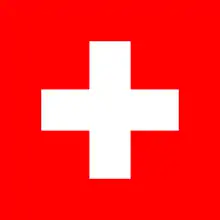Eurovision Song Contest 1979
The Eurovision Song Contest 1979 was the 24th edition of the annual Eurovision Song Contest. It was held on 31 March 1979 in Jerusalem, following the country's win at the 1978 edition. The event was staged at the International Convention Center. The presenters were Daniel Pe'er and Yardena Arazi. Nineteen out of the twenty countries that participated in 1978 also participated, with the exception of Turkey, which withdrew after Arab countries pressured it into not participating in Israel.[1]
| Eurovision Song Contest 1979 | |
|---|---|
 | |
| Dates | |
| Grand final | 31 March 1979 |
| Host | |
| Venue | Ussishkin Auditorium at the International Convention Center Jerusalem |
| Presenter(s) | |
| Musical director | Izhak Graziani |
| Directed by | Yossi Zemach |
| Executive supervisor | Frank Naef |
| Executive producer | Alex Gilady |
| Host broadcaster | Israeli Broadcasting Authority (IBA) |
| Interval act | Shalom '79 (Peace '79) |
| Website | eurovision |
| Participants | |
| Number of entries | 19 |
| Debuting countries | None |
| Returning countries | None |
| Non-returning countries | |
Participation map
| |
| Vote | |
| Voting system | Each country awarded 12, 10, 8–1 point(s) to their 10 favourite songs |
| Nul points | None |
| Winning song | "Hallelujah" |
The winner was Israel with the song "Hallelujah", performed by Milk and Honey. Yugoslavia, who missed the 1978 Contest, also didn't want to take part nor transmit the 1979 show for political reasons. As well as being broadcast live in the 19 competing countries, the contest was broadcast in Romania, Hong Kong and Iceland.
Location

Jerusalem is one of the oldest cities in the world. In the ancient cuneiform, Jerusalem was called "Urusalima", meaning "City of Peace", during the early Canaanite period (approximately 2400 BC).[2] It is considered holy to the three major Abrahamic religions—Judaism, Christianity and Islam.
Format
The stage concept designed by Dov Ben David, inside the stage there is an moving symbol which based on Israeli Broadcast Authority logo. (which was built like a lamp with 3 concentric rings) using a small projected model.[3]
Each country had a jury who awarded 12, 10, 8, 7, 6, 5, 4, 3, 2, 1 point(s) for their top ten songs. This was the last year in which the points were announced via order of appearance, as opposed to order of preference.
The voting was extremely close. Israel gained a good lead in the early stages of the voting, but Spain eventually caught up and took a good lead themselves. At the close of the penultimate jury's votes, Israel were one point behind Spain, and only the Spanish jury had yet to give their votes. Spain ended up giving Israel 10 points, causing the crowd to erupt into enormous cheers.
Participating countries
At one point before the contest Turkey was going to participate. The country would have appeared 11th on stage (between Israel and France), represented by Maria Rita Epik and 21. Peron with the song "Seviyorum" ("I'm Loving"). However Turkey was forced to retire from the contest under pressure from Arab states who objected to a predominantly Muslim country taking part in a contest held in Israel.[4]
Returning artists
The contest saw the return of four artists who had participated in previous editions of the contest: France's representative Anne-Marie David was the winner for Luxembourg in 1973, Netherlands' Xandra represented the country in 1972 and 1976, Norway's Anita Skorgan represented the country in 1977, and Switzerland's Peter, Sue and Marc represented the country in 1971 and 1976.
Conductors
Each performance had a conductor who conducted the orchestra.[5][6]
 Portugal – Thilo Krasmann
Portugal – Thilo Krasmann Italy – N/A
Italy – N/A Denmark – Allan Botschinsky
Denmark – Allan Botschinsky Ireland – Proinnsías Ó Duinn
Ireland – Proinnsías Ó Duinn Finland – Ossi Runne
Finland – Ossi Runne Monaco – Gérard Salesses
Monaco – Gérard Salesses Greece – Lefteris Halkiadakis
Greece – Lefteris Halkiadakis Switzerland – Rolf Zuckowski
Switzerland – Rolf Zuckowski Germany – Norbert Daum
Germany – Norbert Daum Israel – Kobi Oshrat
Israel – Kobi Oshrat France – Guy Mattéoni
France – Guy Mattéoni.svg.png.webp) Belgium – Francis Bay
Belgium – Francis Bay Luxembourg – Hervé Roy
Luxembourg – Hervé Roy Netherlands – Harry van Hoof
Netherlands – Harry van Hoof Sweden – Lars Samuelson
Sweden – Lars Samuelson Norway – Sigurd Jansen
Norway – Sigurd Jansen United Kingdom – Ken Jones
United Kingdom – Ken Jones Austria – Richard Oesterreicher
Austria – Richard Oesterreicher.svg.png.webp) Spain – José Luis Navarro
Spain – José Luis Navarro
Results
The following tables reflect the confirmed, verified scores, which were adjusted after the live broadcast. During the voting announcement, due to a misunderstanding by the presenter Yardena Arazi, Spain appeared to award 10 points to both Portugal and Israel and these scores were added to the scoreboard. After the programme, verification confirmed that Portugal should only have received six points, leaving the total Portuguese score reduced by four points to 64.
Scoreboard
| Results | ||||||||||||||||||||||
|---|---|---|---|---|---|---|---|---|---|---|---|---|---|---|---|---|---|---|---|---|---|---|
| Portugal | 64 | 6 | 2 | 5 | 4 | 4 | 10 | 5 | 3 | 3 | 3 | 6 | 7 | 6 | ||||||||
| Italy | 27 | 8 | 8 | 3 | 8 | |||||||||||||||||
| Denmark | 76 | 2 | 3 | 12 | 1 | 10 | 12 | 6 | 7 | 4 | 8 | 1 | 3 | 3 | 4 | |||||||
| Ireland | 80 | 5 | 5 | 5 | 6 | 10 | 6 | 6 | 3 | 10 | 7 | 8 | 5 | 4 | ||||||||
| Finland | 38 | 7 | 7 | 8 | 5 | 5 | 6 | |||||||||||||||
| Monaco | 12 | 1 | 2 | 4 | 3 | 2 | ||||||||||||||||
| Greece | 69 | 10 | 1 | 4 | 7 | 7 | 2 | 10 | 4 | 1 | 5 | 7 | 2 | 2 | 7 | |||||||
| Switzerland | 60 | 7 | 1 | 10 | 2 | 2 | 7 | 4 | 7 | 8 | 12 | |||||||||||
| Germany | 86 | 2 | 1 | 12 | 5 | 3 | 12 | 6 | 12 | 4 | 1 | 2 | 6 | 8 | 12 | |||||||
| Israel | 125 | 12 | 6 | 12 | 12 | 8 | 4 | 5 | 1 | 2 | 8 | 1 | 12 | 12 | 12 | 8 | 10 | |||||
| France | 106 | 6 | 10 | 1 | 10 | 8 | 10 | 5 | 6 | 12 | 12 | 5 | 7 | 6 | 5 | 3 | ||||||
| Belgium | 5 | 2 | 1 | 2 | ||||||||||||||||||
| Luxembourg | 44 | 7 | 3 | 4 | 4 | 5 | 3 | 2 | 4 | 2 | 10 | |||||||||||
| Netherlands | 51 | 8 | 10 | 5 | 3 | 3 | 7 | 3 | 4 | 4 | 4 | |||||||||||
| Sweden | 8 | 6 | 1 | 1 | ||||||||||||||||||
| Norway | 57 | 3 | 3 | 8 | 6 | 2 | 8 | 2 | 6 | 10 | 7 | 1 | 1 | |||||||||
| United Kingdom | 73 | 4 | 8 | 10 | 7 | 7 | 1 | 2 | 8 | 5 | 10 | 6 | 5 | |||||||||
| Austria | 5 | 4 | 1 | |||||||||||||||||||
| Spain | 116 | 12 | 3 | 6 | 12 | 12 | 8 | 8 | 12 | 10 | 10 | 7 | 1 | 5 | 10 | |||||||
| The table is ordered by appearance | ||||||||||||||||||||||
12 points
Below is a summary of all 12 points in the final:
| N. | Contestant | Voting nation |
|---|---|---|
| 6 | Israel | Finland, Ireland, Norway, Portugal, Sweden, United Kingdom |
| 4 | Germany | Denmark, France, Monaco, Spain |
| Spain | Belgium, Germany, Italy, Switzerland | |
| 2 | Denmark | Greece, Israel |
| France | Luxembourg, Netherlands | |
| 1 | Switzerland | Austria |
Broadcasters, commentators and spokespersons
Spokespersons
Listed below is the order in which votes were cast during the 1979 contest along with the spokesperson who was responsible for announcing the votes for their respective country.[9]
 Portugal – João Abel Fonseca[10]
Portugal – João Abel Fonseca[10] Italy – Paola Perissi
Italy – Paola Perissi Denmark – Bent Henius
Denmark – Bent Henius Ireland – David Heffernan
Ireland – David Heffernan Finland – Kaarina Pönniö[11]
Finland – Kaarina Pönniö[11] Monaco – Carole Chabrier
Monaco – Carole Chabrier Greece – Niki Venega
Greece – Niki Venega Switzerland – Michel Stocker[12]
Switzerland – Michel Stocker[12] Germany – Lotti Ohnesorge[13]
Germany – Lotti Ohnesorge[13] Israel – Dan Kaner[14]
Israel – Dan Kaner[14] France – Denise Fabre
France – Denise Fabre.svg.png.webp) Belgium – An Ploegaerts
Belgium – An Ploegaerts Luxembourg – Jacques Harvey
Luxembourg – Jacques Harvey Netherlands – Ivo Niehe[15]
Netherlands – Ivo Niehe[15] Sweden – Sven Lindahl[16]
Sweden – Sven Lindahl[16] Norway – Sverre Christophersen[17]
Norway – Sverre Christophersen[17] United Kingdom – Colin Berry[6]
United Kingdom – Colin Berry[6] Austria – Jenny Pippal
Austria – Jenny Pippal.svg.png.webp) Spain – Manuel Almendros
Spain – Manuel Almendros
Broadcasters and commentators
Each national broadcaster also sent a commentator to the contest, in order to provide coverage of the contest in their own native language.
| Country | Broadcaster(s) | Commentator(s) | Ref(s) | |
|---|---|---|---|---|
| Participating countries | ||||
| FS1 | Max Schautzer | [9][18] | ||
| Hitradio Ö3 | Walter Richard Langer | |||
| RTBF1 | French: Paule Herreman | [9][19] | ||
| BRT1 | Dutch: Luc Appermont | [9][20] | ||
| RTB La Première | French: Marc Danval | |||
| BRT Radio 1 | Dutch: Nand Baert and Herwig Haes | |||
| DR TV | Jørgen de Mylius | [9][21] | ||
| DR P3 | Kjeld Koplev | |||
| YLE TV1 | Anja-Maija Leppänen | [9][22] | ||
| YLE Rinnakkaisohjelma | Matti Paalosmaa and Jaakko Salonoja | |||
| TF1 | Marc Menant | [9][19][23] | ||
| Deutsches Fernsehen | Ado Schlier and Gabi Schnelle | [13] | ||
| Deutschlandfunk/Bayern 2 | Wolf Mittler | |||
| ERT | Mako Georgiadou | [24] | ||
| Proto Programma | Dimitris Konstantaras | |||
| RTÉ 1 | Mike Murphy | [9] | ||
| RTÉ Radio | Liam Devally | |||
| Israeli Television | Yoram Arbel | [25] | ||
| Reshet Gimel | Yitzhak Shim'oni | |||
| Rete 1 | Rosanna Vaudetti | [9] | ||
| RTL Télé Luxembourg | Jacques Navadic | [9][19] | ||
| RTL | André Torrent | |||
| Télé Monte Carlo | José Sacré | |||
| Nederland 2 | Willem Duys | [9][26] | ||
| NRK | Egil Teige | [9][27] | ||
| NRK P1 | Erik Heyerdahl | |||
| RTP1 | Fialho Gouveia | [9][28] | ||
| TVE1 | Miguel de los Santos | [9][29] | ||
| SR TV1 | Ulf Elfving | [9][16] | ||
| SR P3 | Kent Finell | [16] | ||
| TV DRS | German: Max Rüeger | [30] | ||
| TSR | French: Georges Hardy | [9][23] | ||
| TSI | Italian: Enzo Guidi | [9] | ||
| BBC1 | John Dunn | [6][9][31] | ||
| BBC Radio 2 | Ray Moore | [6] | ||
| Non-participating countries | ||||
| RTHK | Unknown | [6][32] | ||
| Sjónvarpið | Unknown | [6] | ||
| Programul 2 | Unknown | [6] | ||
References
- "Jerusalem 1979". Eurovision.tv.
- BC The Archaeology of the Bible Lands by Magnus Magnusson. BBC Publications London. 1977.
- "An interview with Dov Ben David on the preparations for the Eurovision in Jerusalem". Retrieved June 17, 2020.
- O'Connor, John Kennedy. The Eurovision Song Contest: The Official History. Carlton Books, UK. 2007 ISBN 978-1-84442-994-3
- "And the conductor is..." Retrieved 24 August 2020.
- Roxburgh, Gordon (2014). Songs for Europe: The United Kingdom at the Eurovision Song Contest. Volume Two: The 1970s. Prestatyn: Telos Publishing. pp. 352–365. ISBN 978-1-84583-093-9.
- "Eurovision Song Contest 1979". The Diggiloo Thrush. Retrieved 4 March 2012.
- "Eurovision Song Contest 1979". 4Lyrics.eu. Retrieved 16 September 2020.
- "Eurovision 1979 - Cast and Crew". IMDb. Retrieved 24 August 2020.
- "Comentadores Do ESC – escportugalforum.pt.vu | o forum eurovisivo português". 21595.activeboard.com. Archived from the original on April 21, 2012. Retrieved 2012-08-10.
- "Selostajat ja taustalaulajat läpi vuosien? • Viisukuppila". Viisukuppila.fi. Retrieved 2012-08-10.
- Baumann, Peter Ramón (OGAE Switzerland)
- "Eurovision Song Contest 1979". Ecgermany.de. Retrieved 2012-08-10.
- "פורום אירוויזיון". Sf.tapuz.co.il. 1999-09-13. Archived from the original on October 8, 2011. Retrieved 2012-08-10.
- "Hallelujah: het goede liedje op de goede plaats op de goede tijd, Leidse Courant, 2 April 1979
- "Infosajten.com". Infosajten.com. Archived from the original on July 18, 2012. Retrieved 2012-08-10.
- Dyrseth, Seppo (OGAE Norway)
- "Unterhaltungssendungen im Fernsehen Max Schautzer – Die offizielle Homepage". Max-schautzer.de. 1999-02-22. Retrieved 2012-08-10.
- Christian Masson. "1979 – Jerusalem". Songcontest.free.fr. Retrieved 2012-08-10.
- Adriaens, Manu & Loeckx-Van Cauwenberge, Joken. Blijven kiken!. Lannoo, Belgium. 2003 ISBN 90-209-5274-9
- "Forside". esconnet.dk. Archived from the original on 2012-03-24. Retrieved 2012-08-10.
- "Selostajat ja taustalaulajat läpi vuosien? • Viisukuppila". Viisukuppila.fi. Retrieved 2012-08-10.
- "Au Grand Prix Eurovision de la Chanson". Radio TV - Je vois tout. Lausanne, Switzerland: Le Radio SA. 29 March 1979.
- "Η Μακώ Γεωργιάδου και η EUROVISION (1970–1986)". Retromaniax.gr. Archived from the original on 2012-05-30. Retrieved 2012-08-10.
- From the Hebrew closing credits of the original Israeli broadcast.
- "Welkom op de site van Eurovision Artists". Eurovisionartists.nl. Retrieved 2012-08-10.
- "Hvem kommenterte før Jostein Pedersen? – Debattforum". Nrk.no. Archived from the original on November 2, 2012. Retrieved 2012-08-10.
- "Aleluia, venceu o balão de Israel", Diário de Lisboa, 2 April 1979
- "FORO FESTIVAL DE EUROVISIÓN • Ver Tema – Uribarri comentarista Eurovision 2010". Eurosongcontest.phpbb3.es. Archived from the original on 2012-03-17. Retrieved 2012-08-10.
- Grandprix-Skandal in Jerusalem?, Thuner Tagblatt, 31 March 1979
- "Grand Final: 1979, 1979, Eurovision Song Contest". BBC.
- "EBU Annual Report 2013-2014". European Broadcasting Union. Retrieved June 8, 2019.
External links
| Wikimedia Commons has media related to Eurovision Song Contest 1979. |
